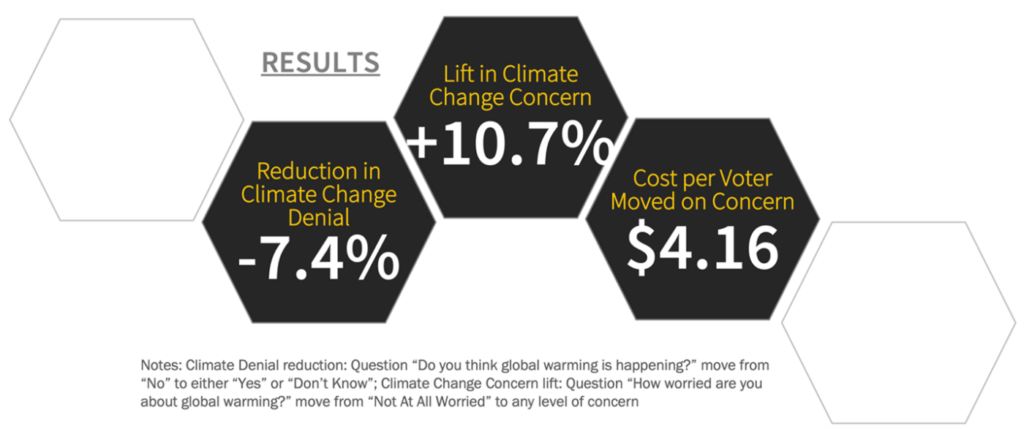
New Climate Voices’ partnership with Centro (now rebranded as Basis Technologies) illustrated how digital advertising can shift opinions on climate change even among highly-skeptical audiences.
As lack of trust in media, institutions, and science seems to steadily increase, the challenge of overcoming these divides feels daunting. This is the challenge that New Climate Voices has taken on. The organization was launched before the 2020 election cycle by conservative leaders from the science, faith-based and government communities with the mission to drive conversation, generate critical thinking and change opinions among conservatives who are skeptical around the causes and impacts of climate change. Basis Technologies was engaged by the organization to design and execute a digital campaign to shift the opinions of these specific audiences on this important topic.
Together, we devised a one-month video-centric campaign in select congressional districts targeting climate skeptics. To bring relevancy and trust to our skeptical audiences, creative messaging appealed to conservative voters by featuring credible, high-profile conservative voices who both believe in the reality of climate change and want to mitigate its damage. We utilized sophisticated data models for targeting to reach persuadable audiences and those identified as moderate climate skeptics – neither believers nor deeply-entrenched deniers. Success was measured by monitoring opinions and views pre- and post-campaign amongst controlled and exposed audiences in a rigorous research program designed and executed by Wick, a technology-forward opinion-research firm that is a leader in emerging research methodology.
The campaign generated a 10.7% Lift in ‘Climate Change Concern’ and a 7.4% reduction in ‘Climate Change Denial’ among targeted conservative voters. New Climate Voices and Basis demonstrated that delivering a precisely targeted audience thoughtfully crafted messages from influential peer voices in a visually engaging medium, at effective frequency levels is a successful recipe to affect and drive perception.
Here are four impactful campaign elements.
Trust-Worthy Messaging: Establishing trust and educating audiences on relevant data points are vital elements in a communication strategy to shift opinions on contentious topics such as climate change. To increase perception with conservative and moderate voters that climate change is happening, humans caused it, and it is cause for concern, New Climate Voices created a series of videos for conservative voters utilizing authoritative spokespeople aligned with their values. A U.S. Air Force General, a Climate Scientist who is also an evangelical Christian, and members of the GOP were leading ‘voices’ on this campaign.
Persuadable Audiences: We wanted to reach moderate climate skeptics -- those designated as “cautious” or “doubtful” according to a Yale study, who could be persuaded with the right messaging. To reach this audience, Basis identified swing districts with a high concentration of voters who were doubtful of climate change. Leveraging voter file research and climate non-believer modeling with audience data partners L2 and HaystaqDNA, we identified a middle range of voters that were neither believers of climate change nor hardened deniers. Using the voter file, custom modeling segments were created for media targeting as well as polling research.
Frequency and Sequential Retargeting: The campaign delivered long and short-form videos and retargeting display ads speaking directly to conservative values. Message frequency averaging 7+ views per voter during the 4-week flight ensured adequate exposure to influence and change perception. Rotation of creative units was dictated by pre-campaign message testing in efficacy, with sequential retargeting and strategic messaging frequency building the story of climate change.
Smart Measurement : A polling research study designed and conducted by Wick measured both pre-post and treatment-control groups. A mix of collection modalities including IVR polling to landlines, text message to cell phones, and email/online panel was used to abate mode bias and maximize response rates across demographic groups. Prior to launching the advertising campaign, a treatment group and a randomly assigned control group were surveyed to evaluate awareness of and opinions about climate change. They were surveyed again after the advertising campaign to measure “Absolute Lift,” a method considering news coverage or other outside forces that may have affected the audience’s views during the campaign flight.
Digital channels are an effective way to influence voters. Among targeted Republican voters, the campaign resulted in a 7-percentage-point increase in belief that global warming is happening, a 10-point increase in understanding that global warming is human caused, an 11-point increase in global warming issue importance, a 13-point increase in worry about global warming, a 12-point increase in perceptions of personal harm, and a 16-point increase in perceptions of harm to future generations.
Opinions can seem deeply entrenched, but this effort demonstrates how a thoughtful approach to messaging and precise targeting can move the needle. When legislation and elections can be decided by very narrow margins, the difference between winning and losing could come down to how campaigns affect perceptions.

Basis Technologies’ Candidates + Causes Group has been driving perception on the most prominent public issues for more than a decade. Our technology and services have been trusted by agencies and consultants in politics, public affairs, and advocacy. We’ve collectively worked with 1500+ political campaigns and independent expenditure committees, and 2000+ issue advocacy advertisers over the past 15 years. Reach out at info@basis.com to learn more.